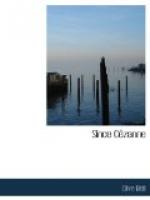Yet I daresay it was this jovial and unaffected good-fellowship, quite as much as his unquestionable genius, that won the brave douanier his place in the hearts of those brilliant people who frequented what he used to call his “soirees toutes familiales et artistiques.” The artists and intellectuals of my generation—the generation that received and went down before the terrific impact of Dostoievskyism—pursued the simple and unsophisticated at least as earnestly as any follower of an earlier Rousseau. Whatever the real differences between a noble savage and an unspoilt artisan may be, the difference between the ideas of them with which a jaded society diverts itself is negligible. “Il nous faut les barbares,” said Gide. Well, we have got them. [H] And, maybe, the next generation but one will make as much fuss about a new Matthew Arnold as we made about Marguerite Audoux.
[Footnote H: This essay was written a few weeks after the signing of the Armistice.]
Meanwhile the douanier came at the right moment. His “soirees toutes familiales et artistiques” were crowded with admirers—Picasso, Delaunay, Duhamel, Guillaume Apollinaire, Jules Romain, Max Jacob, Rene Arcos, Braque, Andre Salmon, Soffici, Blanche Albane, Marie Laurencin, elegant and eminent people from North and South America, Russia, Germany, and Scandinavia, to say nothing of his pupils (he professed both painting and music) and “les demoiselles de son quartier.” The entertainment consisted, if I may trust an ear-witness, of a little bad music worse played, a little declamation, a glass of wine, and democracy untainted with the least suspicion of snobbery. There was a delicious absence of culture, on the one hand, and of romantic squalor on the other. The whole thing was solidly and sympathetically lower middle-class. The “soiree tant familiale qu’artistique” closed with a performance of the Marseillaise; and the intelligentsia retired to bed feeling that life was full of beauty and significance.
[Illustration: MATISSE (Photo: E. Druet)]
CEZANNE [I].
[Footnote I: Paul Cezanne. Par Ambroise Vollard. (Paris: Cres. 4fr. 75.)]
It was the opinion of Degas that “le peintre en general est bete,” and most people seem to think that Cezanne was no exception to the rule. Before agreeing, I should want to know what precisely they understood by the word “bete.” Cezanne was silly certainly, but he was not stupid: he was limited and absurd, but not dull; his opinions for the most part were conventional, but his intelligence was not common; and his character was as obviously that of a man of genius as the most ardent hero-worshipper could desire.




